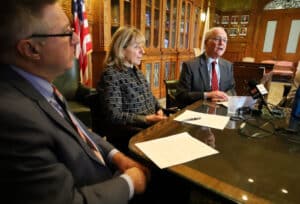
Senate President Karen Spilka, center, speaks to reporters alongisde Sens. Michael Barrett and Michael Rodrigues, right and left, in this Jan. 23, 2020 file photo. Photo by Sam Doran | State House News Service
Senate President Karen Spilka touted solid communications among state leaders during the virus crisis, but on Sunday also hinted at a source of underlying tension on legislation intended to protect renters and homeowners from losing their homes during the COVID-19 state of emergency.
Striking a balance that also involves building owners, she said, is key to the House and Senate reaching agreement on bills that on Thursday were sent to a conference committee for resolution.
Both the House and Senate appear united in wanting to protect struggling homeowners and renters, but some landlords and building owners are also facing financial difficulties. Spilka mentioned measures in the Senate’s bill that would delay, rather than forgive, rent and mortgage payments.
“We’re very clear, people are still responsible for their rent, for their mortgage, it just may be delayed,” she said.
What’s in Each Bill?
The Senate approach lets cities and towns work out agreements with landlords on property tax due dates, she said, and utilities are working with building owners on payment alternatives. The House and Senate have struggled in recent weeks to find common ground on the eviction moratorium bill.
The House bill (H.4615) explicitly imposes a moratorium on non-emergency judgments and default judgments, while the Senate version (S.2631) only covers default judgments. Backers of the House’s approach argue that leaving some judgments excluded creates a risk that middle steps of the eviction process will continue while the moratorium is in place, putting pressure on tenants to forego rights or to seek new housing despite the public health risks.
Meanwhile, the Greater Boston Real Estate Board flagged concerns that both versions ban landlords from sending notices to quit, which GBREB CEO Greg Vasil said in a letter blocks landlords from starting the process and getting attention of tenants with whom they have disputes.
Gov. Charlie Baker said he hopes lawmakers can resolve differences and send him a viable bill pausing all eviction and foreclosure proceedings statewide by next week.
During a Facebook Live interview with El Mundo Boston on Saturday that host Alberto Vasallo III translated into Spanish, Baker said he is precluded by law from temporarily banning housing removals via executive order but that his administration has been working with the legislature to try to prioritize the issue.
Baker did not explicitly endorse either branch’s approach, and he said he hopes negotiators find compromise soon on something he can support.
“I know they’re working on it this weekend and my hope is by next week they’ll get a bill to me that I can sign,” Baker said.
Baker: ‘Bullying’ Victims Can Get Help
A trial court standing order has halted most hearings, but advocates say a formal moratorium is necessary to protect the most vulnerable from pressure.
Baker stressed to viewers that his office has staffers who speak Spanish and that several local and regional organizations can help tenants or homeowners facing financial pressures amid the coronavirus pandemic, particularly those who may feel “bullied” by landlords or banks because of language barriers.
Under existing state law, Baker said, tenants have 60 days to resolve issues before removal and homeowners have 90 days. He recited the phone number for his office’s constituent services department and pledged to provide El Mundo with a list of resources to pass to viewers.
“It’s outrageous that anybody would bully anybody at this point in time,” he said. “These are the things that a lot of the folks who do this work for a living who are funded by governments and by private agencies can help people with, and that’s why it’s important that we get that list to you.”




 |
| 

